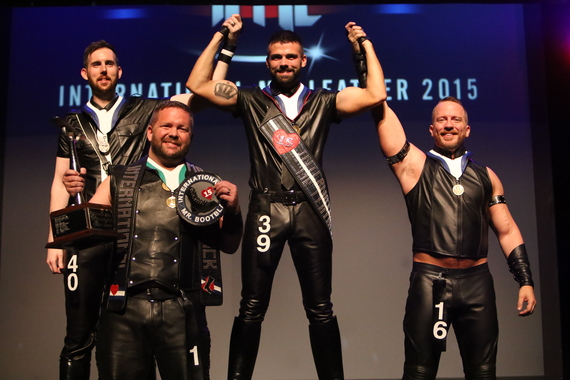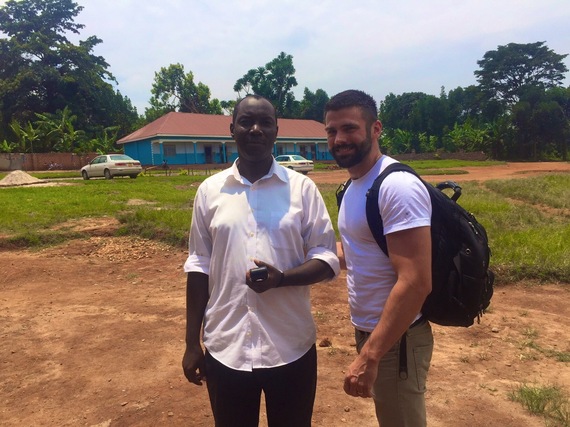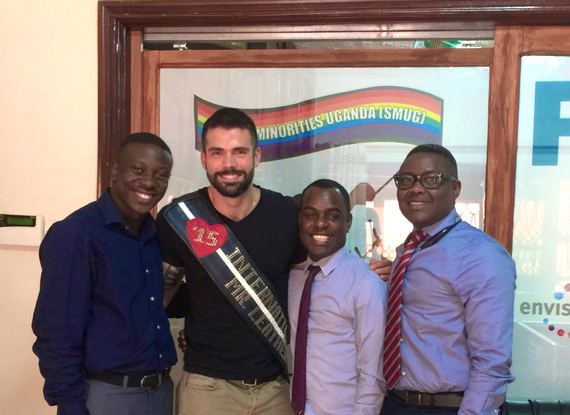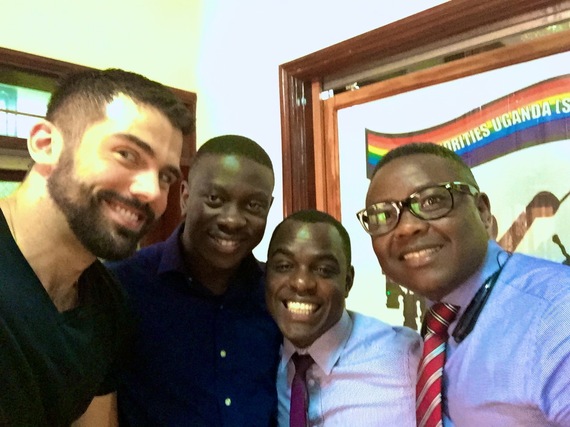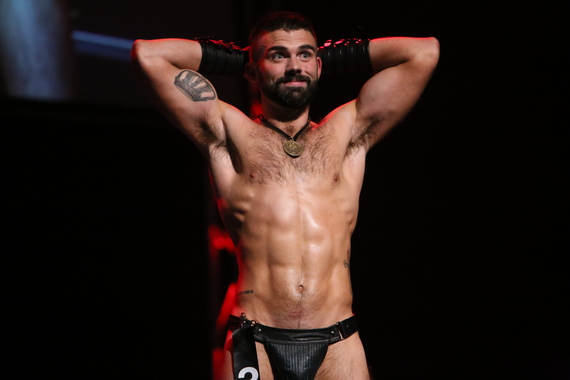Mr. Smith Goes to Uganda: International Mr. Leather's Worldwide Mission for Equality
Chicago has been known to have some very cold winters, but one thing’s for sure: Every Memorial Day weekend, the so-called “Windy City” becomes the hottest place in the world for the GLBT’s tight-knit Leather community. That’s because thousands of Leathermen, Leatherwomen, kinksters of all varieties and their admirers from all over the globe convene for International Mr. Leather (IML). The long weekend always kicks off with pre-IML activities on Thursday, and the traditional grand finale is the “Black and Blue Ball” on Monday night. In between, there are educational seminars, meet-and-greets, merchandise marts, silent auctions and many, many parties to represent a wide range of the community’s assorted fetishes and kinks. IML, widely considered to be the “Big Daddy” of all the Leather events in the world, is all about Leather awareness and education, unity in the Kink and the GLBT community at large and… celebration! And, of course, there’s that climactic moment on Sunday evening when one lucky man is selected to be the face of the Leather Nation. What was born as a relatively small annual event in the 1970’s — the “Mr. Gold Coast” Contest held at Chicago’s Gold Coast Leather bar — has gradually became the major happening that it is as we approach 2016. IML has expanded from 12 contestants its first year to 52 in 2015, with men from a large number of different countries who encompass many ethnicities, ages and lifestyles.
Patrick Smith of Los Angeles is International Mr. Leather 2015. Originally from Winnipeg, Manitoba, the classically handsome Leatherman had been named both “Eagle LA Mr. Leather 2015” and “Mr. Los Angeles Leather 2015” in March early this year. At his big win in Chicago, his mother and sisters joined him on stage in what was one of the most memorable moments of IML 37. As full-time Ambassador for the Leather Community, Smith is determined to emphasize the “International” in his Title. He is committed to the fight for universal GLBT equality as well as for the unapologetic sexual freedom that characterizes the Leather community. That commitment included traveling abroad.
Prior to winning the title, Smith had traveled to India and to numerous Latin American countries. Not long after IML, he was off to Uganda, the African country which received widespread attention in North America for the law that was nicknamed the “Kill The Gays Bill.” The hard-line stance in that nation was largely stimulated in 2009, when a Member of Parliament introduced The Anti Homosexuality Act. The Act would have broadened the criminalization of same-sex relationships in Uganda, as well as introducing the death penalty for “serial offenders,” HIV-positive people who engaged in sexual activity with people of the same sex, and persons who engaged in same-sex sexual acts with people under 18 years of age. In addition, individuals or companies that “promoted” LGBT rights would be fined, imprisoned or both. A slightly watered-down law (punishment of life in prison, instead of the death penalty, for “aggravated homosexuality”) eventually emerged in 2014. That law was annulled (on a technicality), but not before ushering in the more extreme and even violent spirit of homophobia which exists today.
Homosexuality remains a criminal act in Uganda. In fact, it’s well known that a lot of African countries are not safe spaces for openly gay people– for religious and/or political reasons. Smith offers his own observations on the subject:
There is a deep fear and misunderstanding of the GLBT community among many Africans, which is being stoked by irresponsible church leaders and politicians. And in many ways, it’s not unlike the prejudices that were being spread in the Western world not so long ago. Anti-gay figureheads in Africa speak about the need to ‘protect’ children from GLBT people, which echoes the messaging used by U.S. anti-gay figures such as Anita Bryant in the 1970s. And it’s no coincidence — there is a disturbing amount of cooperation between U.S. anti-gay groups and African politicians to pass the heinous legislation that we’re seeing there. That’s why it’s important we continue to fight these anti-gay groups here at home. Despite our recent domestic victories, people are still in need of our help abroad.
It’s a safe bet that most of us will probably never make it to Uganda! Was the visit a culture shock for Smith? He tells me:
There was a culture shock, but I will say that the people of Uganda are incredibly warm and friendly, and did all they could to make me feel welcome. Day-to-day life is so different based on your socioeconomic status there. On one hand, I visited a church with some of the country’s most affluent citizens all dressed to the nines, who could fit into the Western world without anyone batting an eye. On the other hand, you see extreme poverty with citizens selling their wares on the side of the road just to make enough to put food on the table.
I asked Smith if the natives reacted a certain way to a tall, striking-looking Caucasian stranger visiting their homeland. He responded:
They did. I visited a school in a rural part of the country and I had the incredible opportunity to conduct a lengthy Q&A session with an eighth grade class. I was told that for most of the students, it was their first time seeing a white person face-to-face. Later in the village, I did turn a few heads, but it was nothing threatening– just genuine curiosity. Everyone I spoke with was very pleased that I was visiting. They are very proud of their country, and looking beyond the human rights concerns, it is a beautiful place.
What was the most challenging part of Smith’s visit to the African country?
It was actually a bit of a challenge contacting and getting meetings with the community leaders there, but for good reason. Everything is so underground. They have to be very, very careful about whom they put their trust into to meet with, to disclose their address to, etc. There is the very real risk of entrapment for them there. So it took many conversations over e-mail, Facebook and by phone before a level of trust was built allowing me to visit their homes and places of work.
Smith still doesn’t know if the Ugandan government ever knew about his visit. He tells me:
They certainly didn’t know in advance of my visit; I was very discreet in the lead-up to it. My family actually begged me not to go, and while that wasn’t an option for me, I did commit to not publicizing the trip in advance. The most nerve-wracking part of the trip was going through customs once I landed. I had only one backpack with me, which contained my IML sash, correspondence between me and some of the most prominent gay rights activists in Uganda and a computer full of research on the status of the gay community in the country. I was terrified I would be selected for a random search. I still don’t know what would have happened if they had searched me.
After Uganda, Smith went on to visit the Ukraine. When I asked him about why he chose to visit there, he tells me:
I wanted to learn about how the ongoing Russia/Ukraine conflict has affected the community there. I was actually expecting a better situation than what I found, which is unfortunate. Despite now living under a pro-European Union regime, things have gotten worse for the gay community since the revolution in 2014. Pro-Russian forces in Ukrainian border communities are terrorizing GLBT people there — assaulting them, driving them out of their homes. I met with four women living in a shelter in Kiev, who had to flee their homes in Donetsk and Luhansk along the Russian border. They had to pack up everything and flee at a moment’s notice, fearing for their safety due to their sexual identity. It was a terribly heartbreaking story to hear.
A lot of American GLBT’s may wonder why they should care about what happens in foreign countries, when we are still fighting our own struggle for equality on a day-to-day basis. What would International Mr. Leather say to them? He answers:
I would ask them to think, next time they’re sipping champagne at a friend’s same-sex wedding, about what life would be like if they had to fear an 18-year prison sentence for having sex with the person they love. I do understand that there are still battles to be fought at home, but we are light years ahead of where these people are in the international community. And the reason I’m going to these places is to hopefully bring some awareness to this. Should we keep fighting for employment non-discrimination and ending the ban on donating blood? Absolutely. But I think we should start focusing more and more resources on our GLBT brothers and sisters abroad, who are fighting for their lives.
I ask him: As individuals, what can each and every one of us in the U.S. and Canada do to fight for equality worldwide on a daily basis on a local level? He tells me:
There are a few things we can do. First: Money talks. The groups I met with are all able to accept foreign donations, and we must be willing to open our wallets to help them. We also must continue to put political pressure on our leaders to call out GLBT rights violations abroad. In Uganda, it worked. Their most recent anti-gay bill was struck down by the courts and activists, and we are optimistic it will never come back thanks to the international backlash it received in the first go-around. Lastly, there are a disgusting number of US-based anti-gay groups that are funding and lobbying for international anti-gay legislation that would throw GLBT people in jail for life, or worse. We need to work to expose these groups here at home, handicap their fundraising efforts and get them listed as registered hate groups.
For many people, Leathermen are seen as the epitome of classic masculinity and overt, unapologetic sexuality. Arguably the most visible member of the worldwide Leather community, Patrick Smith is clearly not content to be solely a sex symbol or a nightlife presence. He tells me, “I love the Leather contests and the parties, but it’s more rewarding for me to learn about– and hopefully, help to influence — the state of our community in parts of the world where GLBT people still live on the fringes of society.” Only five months into his reign as International Mr. Leather, Smith has clearly shown his willingness to venture into unfamiliar (and possibly even unsafe) territory to reach his goals. This is one leader worth following!
You can follow Patrick Smith at www.PatrickJonSmith.com. To learn more about IML, visit www.IMRL.com.
(All photos courtesy of Patrick Smith.)
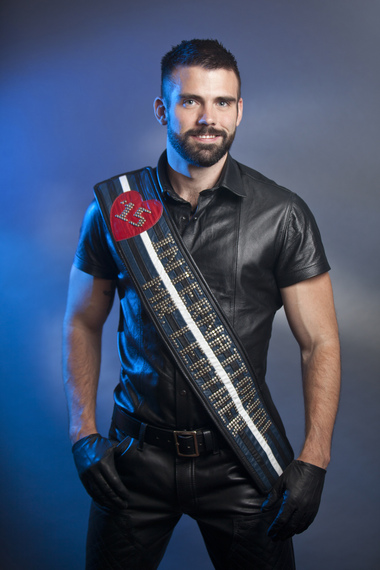
— This feed and its contents are the property of The Huffington Post, and use is subject to our terms. It may be used for personal consumption, but may not be distributed on a website.
You Might Like

